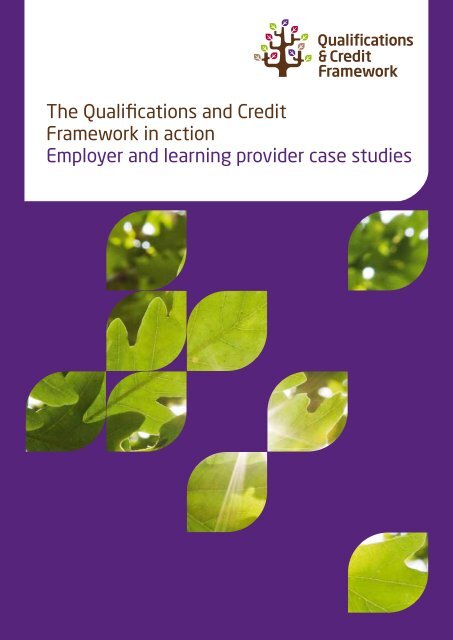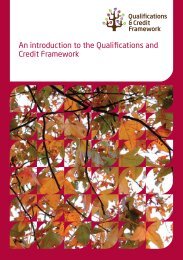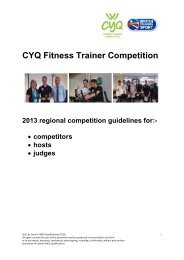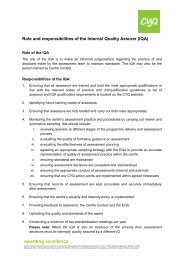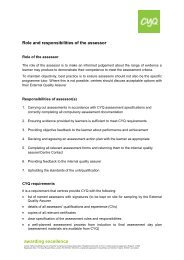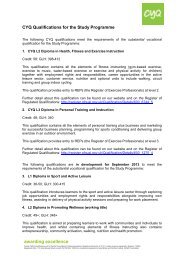Download (418Kb) - Digital Education Resource Archive (DERA)
Download (418Kb) - Digital Education Resource Archive (DERA)
Download (418Kb) - Digital Education Resource Archive (DERA)
Create successful ePaper yourself
Turn your PDF publications into a flip-book with our unique Google optimized e-Paper software.
ForewordI’m delighted that the Qualifications and CurriculumDevelopment Agency (QCDA) and our partnershave been able to publish the case studies includedin this brochure. They show the good progressthat’s been made across the further education andbusiness landscape as the Qualifications and CreditFramework (QCF) is implemented.We’ve been building the QCF for the last five years,first as the Qualifications and Curriculum Authority(QCA), and now as QCDA. During this time, we’vereceived support and interest from colleaguesworking both in education and in business.Learning providers and employers are essential tothe success of the QCF. They can put all the piecestogether and connect learning experiences in theclassroom and at work with a curriculum that makesthe most of the QCF’s flexibility. They empowerlearners to personalise their learning experienceto suit their own aspirations. Without them the‘back wiring’ of the QCF will mean nothing.Over the following pages, you’ll see how theQCF is starting to come alive in the real worlds ofcolleges, training providers and businesses.In these 12 case studies learning providers andbusinesses talk about how and why they’ve gotinvolved in the QCF and how it’s benefiting them.I hope you’ll be inspired to get involved with theQCF to realise its exciting potential.Special thanks go to the Association of LearningProviders and the Association of Colleges forcontributing to the illustrations.Sue GeorgiousDirector of QCF and lifelong learning3
IntroductionWhat is the QCF?The QCF is the new framework for creating andaccrediting qualifications in England, Wales andNorthern Ireland.It’s at the heart of a major reform of the vocationalqualifications system, which will become simplerto understand and use, more accessible to a widerrange of learners and more relevant to learners’and employers’ needs.There are no fixed teaching or learning methods inthe QCF. Tutors and trainers can shape QCF unitsand qualifications to the needs of their learners.This freedom and flexibility means learning can beclassroom based, work based, online or a mixtureof all these and much more.For more information on the QCF and how it worksvisit www.qcda.gov.uk/qcf.How does the QCF work?All qualifications in the QCF are built from smallerunits of learning. Learners can build up units at theirown pace and put them toward a full qualification.They can bank all their achievements over timeand keep them as they move from education intoa job or from one job to another. They don’t haveto study anything they already know.Through the QCF learners can achieve nationallyrecognised qualifications in ways they couldn’tbefore. That could mean gaining a qualificationthrough training at work or studying part-time.Staff at B&Q, for example, are now gaining arecognised qualification through completingtheir in-house training programme in homeimprovement. Initiatives like this will supportthe government’s agenda to keep young peoplein education and training, and help encourage aculture of lifelong learning.4
Employer case studiesHondaThe car manufacturer Honda has been atthe forefront of hybrid car production sincethe release of its first hybrid model inDecember 1999.Working with the QCFWith the launch of the hybrid car came theneed for mechanics with the skills to keep thisnew technology on the road. Honda, along withToyota and BMW, worked with the Instituteof the Motor Industry (IMI) under the QCF todevelop a level 2 and a level 3 qualificationin maintaining hybrid technology cars.The level 3 qualification, a skills-based awardin automotive internal combustion and electrichybrid system repair and replacement, is beingoffered at the Honda Institute to mechanicsacross the car manufacturing industry.The level 2 qualification, a knowledge-basedaward in automotive internal combustion andelectric hybrid technology components andoperation, is being offered by colleges andother learning providers across the country.Further education colleges can also make fulluse of the QCF’s flexibility by using the level 2unit in the wider automotive qualifications andapprenticeships that they already offer."I believe I speak for the industry aswell as Honda when I say that this notonly benefits learners but it’s also theresponsible thing to do in terms ofend-user safety and awareness.Independent car mechanics can alsogain a nationally recognised qualificationand therefore assure motorists thatthey’re servicing a hybrid car correctlyand safely."Eliot Smith, technical training coordinatorat the Honda InstituteSharing the experienceIn the past, technicians, especially those withno formal qualifications since school, haveseen a lot of their hard work go unrecognised.Now, through this flexible approach to furtherlearning, they’re gaining motivation andconfidence, and increasing their skills levels.5
McDonald'sMcDonald's is the world's largest chain of quickservice restaurants. It invests £15 million each yearin its well-established and long-running in-housetraining scheme to help staff at all levels developand progress.Working with the QCFTo take its in-house training to the next level,McDonald’s got involved with the QCF to becomean awarding organisation that can develop andaward its own nationally recognised qualifications.The first qualification accredited by McDonald's,in September 2008, was a level 3 Diploma in shiftmanagement. The qualification covers everythingthe company’s 7,000 managers across the countryneed to know about managing a McDonald'srestaurant, from the day-to-day running tofinance, marketing and human resources. It wasdesigned as the first course managers wouldattend during their career with McDonald's."Receiving official awardingorganisation status in January 2008was an important and exciting step forMcDonald’s. As a progressive employerwe’re committed to taking a leadershipposition on training and skills.We want to ensure that our approach torecruitment, training and developmentcontinues to create valuable opportunitiesfor our people."David Fairhurst, chief people officer andsenior vice president at McDonald'sSharing the experienceMcDonald’s employees now have their hard workand skills recognised both internally and by otheremployers in the service and hospitality sector,and can continue to develop through their work.McDonald’s is finding it easier to attract recruitsand then employ them for longer. There are nowplans to offer accredited training in other areasof the business.8
Westminster KingswayCollegeWestminster Kingsway College in Londonteaches a wide range of further, adult and highereducation programmes. Its main clients includeadults who are unemployed or low-skilled andemployers looking for customised courses to traintheir staff in subjects like hospitality, and businessand management.Working with the QCFEmployers were telling Westminster KingswayCollege that they wanted short, focused trainingcourses that were tailored to their company’sneeds but wouldn’t break the bank. The nationalqualifications on offer were proving tootime-consuming and costly to fit the bill.The QCF gave Westminster Kingsway Collegethe chance to work with employers to designand accredit training that ticked all their boxesand opened the door for learners to gain nationalqualifications and a nationally recognisedcertification. Without the QCF it wouldn’t havebeen possible to certify such training.Sharing the experienceNow the college has developed a set ofcustomised courses and learning programmesfor employers, it’s eager to see what next stepsthe QCF and sector skills councils (SSCs) willtake in developing qualifications. However, atthe moment the QCF needs more funding beforeit can catch up with the qualifications system andreach its full potential."What we’re looking for from the QCFand SSCs is the ability to really customiseprogrammes and really put programmesof units together to meet the needsof employers and put employers in thedriving seat."Andy Wilson, principal at WestminsterKingsway College12
Bournville CollegeBournville College in Birmingham offersteaching and training to about 12,000 learnersacross three main sites. It offers academic,vocational and higher education qualificationsto suit learners of all ages, including schoolleavers,adults getting back into education andemployers looking to train their workforce.Working with the QCFThe college used the QCF to build a tailoredcurriculum that lets learners of all ages planthe learning route that best suits their needsand circumstances. This gave learners theoption of learning in smaller units that arecertificated at each stage, helping to motivatethem and build their self-confidence.The college implemented the QCF byappointing QCF champions and setting up asteering committee made up of curriculumand business representatives. The curriculumdevelopment managers in the college werealso given professional development sessions.Sharing the experienceThe QCF is now part of the college's businessplanning, processes and models. Next, thecollege intends to embark on a review of thenew curriculum structure and, in turn, optimisesuccess rates and the learning experience.The college still has a few hurdles to jumpbefore the QCF can be called a success. Forone, it needs to tackle the mounting cost ofregistration exams. It’s also gearing itself forfuture Ofsted partial performance reviews,and making sure that all students have accessto enough information, advice and guidanceabout the QCF and its possibilities for them."Last year, we had a pilot based onFoundation Learning students, of whichwe have over 1,000; a number of thesestudents have learning difficulties or adisability. The pilot was centred aroundmeeting everyone’s needs, and itallowed us to develop more coherentvocational pathways in which studentscould mix functional skills withvocational training.Norman Kay, principal at Bournville CollegeThe benefits"The QCF is an attempt to simplify thecurriculum on offer, to make it manageablefor learners and to allow learners to meettheir own expectations.13
Rathbone centre in DerbyRathbone is a UK-wide voluntary youthorganisation that gives young people the chanceto transform their lives. Its founding belief is thateveryone, whatever their background, can makeprogress through learning.Each year, over 15,000 young people joinits Train to Gain, apprenticeships, Entry toEmployment (E2E) and Foundation Learningprogrammes.Working with the QCFDerby was one of six Rathbone centres inEngland to join the national FoundationLearning pilot. The Derby team were keen tojump on board and get ahead of the game infinding out what the QCF was really about.They started to recruit for the programme atthe end of January 2009. At first, there wereonly six students, but the numbers soon beganto grow and 44 students were signed up by theend of the year.For the first 10 weeks of the programme,students went to the training centre for 16hours a week and worked toward employabilityand personal development units and functionalskills. They then joined work placements as andwhen a suitable place came up and they feltconfident enough to enter the world of work.Sharing the experienceWorking toward units and credits has reallymotivated Rathbone Derby’s students so far,and they’ve thrived on the bite-sized chunks ofwork. Because of its direct claims status withCity & Guilds, Rathbone can claim certificatesas soon as students achieve units. This has ledto a friendly rivalry springing up among thestudents over who has the highest numberof credits. A high proportion of students haveprogressed to an apprenticeship.The programme’s tutors are enjoying theflexibility of the QCF and find it easier to monitorand manage achievements. They can be creativein the way they design the curriculum so it reallydoes meet the needs of individual students andis relevant to the world of work.The employability and personal developmentprogramme is a good example. Activities liketrips to the local retail centre and talks bysecurity staff about terrorist threats havemade real sense to the students.What’s more, employers are starting to sit upand take proper notice of the possibilities ofthe QCF and the new qualifications:"Employers have noticed a difference;they’ve commented on how much morefocused and keen to achieve studentsare. They’ve been impressed by students’enthusiasm for collecting informationfrom the workplace that is relevant to thequalification they’re working toward."Aaron Denton, one of the lead tutors at theRathbone centre in Derby14
KEITS LtdKEITS Ltd is an independent training provider basedin Hertfordshire. It works with businesses involvedin horse and animal care, floristry and horticulture.Working with the QCFKEITS Ltd was presented with a challenge whenanimal care and horticulture became the firstNVQ qualifications to be replaced with the newQCF Diploma.The team had to decide how best to handle thenew qualification structure and ensure thatindividual learners were being offered the bestroutes through qualifications.They also had to keep an eye on the cost ofimplementing the QCF and the cost of individuallearners’ programmes. Despite a much widerchoice of units, time and funding were still limited.Employers needed coaxing to suggest the unitsthat would best fit with their workforce and notbe a burden to them or their employees.Sharing the experienceSo far, KEITS Ltd has found that both employersand learners are enjoying the greater flexibility ofthe QCF. It allows employers to tailor programmesto suit their employees’ individual developmentneeds. For example, animal care is a diverse sectorwhere learners once took a very general trainingroute through an NVQ . Learners can now focuson specialisms like zoos and wildlife, and kennelsand catteries.The structure and wording of the qualificationshave also become clearer and more defined, whichmakes them easier for employers, learners andassessors to understand.Preparing for the introduction of QCF qualificationshas been a challenging but rewarding experiencefor the whole team at KEITS, and a lot of lessonshave been learnt over the last year:"When changes to qualificationsare on the horizon, you need to buildin development time to ensure thatinformation is prepared and availableearly enough for all who need it. It’s easyto miss some key people out and assumethat they’ll be able to understand and runwith the changes.Making the information simple enoughwithout losing the benefits, and gettingassessors and business developmentteams to really take it onboard and yet beaware of the potential issues of makingthe qualifications too large to be able todeliver them cost effectively, proved to bea challenge, but we’re getting there.Rebecca Diamond, KEITS directorfor centre awards"The team are now busy preparing to implementQCF qualifications in other sectors. They’re alsolooking at funding opportunities for the deliveryof QCF Awards and Certificates in animal care,to go with the Diplomas already on offer.15
City College NorwichCity College Norwich (CCN) is one of the largestcolleges of further and higher education in theUK. It offers young people, adults and employers acomprehensive range of courses, from FoundationLearning and Entry level to postgraduate andprofessional qualifications.The college has a strong commitment to lifelonglearning and to promoting learning in the community.Working with the QCFCCN was the first provider to be accredited asan awarding organisation under the QCF, whichmeant it could fill any gaps it came across in thequalifications market. For example, after noticinga lack of banking qualifications in England, thecollege worked with the Financial Services SectorSkills Council to develop a suite of new bankingqualifications (level 5 and level 7 units) to plugthe gap.CCN also kept talking to local employers, puttingeducation in direct contact with business.One of its main priorities has been to set up acurriculum that develops the knowledge, skills andunderstanding needed by employers.One of the original qualifications CCN exploredwas an induction programme for new recruitsto the financial services sector in Norwich.Insurance companies Marsh, Norwich Union (nowAviva) and Swiss Re were among the contributorsto the programme's design. The course runsover a number of days at CCN's National SkillsAcademy and includes a range of units relevantto the organisations taking part.Sharing the experienceCCN has a plan for taking the QCF forward andhas created a number of units in the last sixmonths. Next, it will carry out a curriculum reviewof all qualifications, looking at ways it can takeadvantage of the QCF’s flexibility to make thequalifications more personalised for students.CNN’s students have gained a valuable insightinto the world of work out of this close workingrelationship between college and employer.By accrediting providers like CCN, the hope is tonurture the gradual development of more coursesthat have the local community at heart and aremore relevant to learners."The potential for the QCF isunlimited really because of the number ofunits, the flexibility, the different optionsand combinations of units. It's really upto us to create and develop, so its trueopportunity is the personalised learningfor individuals and employers."Dick Palmer, principal at CCN16
Find out moreVisit the QCDA website for a comprehensive listof guidance and support materials on the QCF atwww.qcda.gov.uk/qcfreadiness.More information and support is also available:• for learners — search for 'QCF' atwww.direct.gov.uk• for awarding organisations — search for 'QCF'at www.jcq.org.uk or click on 'QCF capacitybuilding' at www.awarding.org.uk.• for learning providers — search for 'QCF' atwww.aoc.co.ukwww.learningproviders.org.ukwww.excellencegateway.org.uk/qcfhttp://qfr.lsc.gov.uk.• for employers and sector skills councils — go towww.businesslink.gov.uk/vocationalqualifications.For information about the regulatory arrangementsof the QCF visit www.ofqual.gov.uk/qcf.For more information about vocationalqualification reform visit www.bis.gov.uk.Further information about the organisations inthis booklet can be found at their websites:Honda: www.honda.co.ukDnA Awards Ltd: www.dna-awards.co.ukSkillsmart Retail: www.skillsmartretail.comMcDonald's: www.mcdonalds.co.ukB&Q: www.diy.comPLASA: www.plasa.orgigen Future Pathways: www.igengroup.co.ukWestminster Kingsway College: www.westking.ac.ukBournville Centre: www.bournville.ac.ukRathbone: www.rathboneuk.orgKEITS Ltd: www.keits.co.ukCity College Norwich: www.ccn.ac.uk17
Qualifications and CurriculumDevelopment Agency53—55 Butts RoadEarlsdon ParkCoventry CV1 3BHTelephone 0300 303 3011info@qcda.gov.ukwww.qcda.gov.ukWe want our website and publications to be widely accessible, so pleasecontact QCDA if we’re not meeting your needs.The Qualifications and Curriculum Development Agency is the non-regulatory part of theQualifications and Curriculum Authority, an exempted charity under the Charities Act 1993.QCDA is developing the QCF with partners as part of a major reform of the vocationalqualifications system.© Qualifications and Curriculum Authority 2010First published in 2010Reproduction, storage or translation, in any form or by any means, of this publication isprohibited without prior written permission of the publisher, unless within the terms of theCopyright Licensing Agency. Excerpts may be reproduced for the purpose of research, privatestudy, criticism or review, or by educational institutions solely for educational purposes,without permission, provided full acknowledgement is given.QCDA/10/4794ISBN 978-1-84962-393-3


